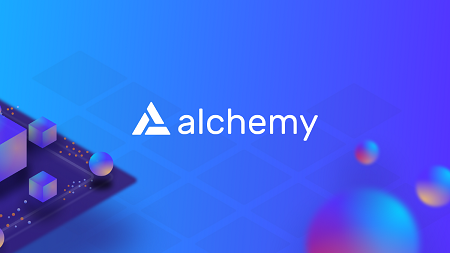Last updated on November 17th, 2022 at 12:12 pm
Alchemy, a powerful blockchain development platform, offers a collection of developer tools. The platform’s robust APIs are available to developers creating apps that interact with Ethereum. Developers can also use the APIs to enhance their apps. They can also benefit from the features not found in vanilla nodes.
In addition to this, Alchemy offers alerting, analytics, logging, monitoring, and debugging services. The platform supports 4 million users globally and powers on-chain transactions worth more than $7.5 billion for leading DeFi protocols.
This article comprehensively explores the Alchemy platform, providing valuable insight into its functionalities and offerings.
What is Alchemy?
Alchemy is a developer platform that allows businesses to create scalable, decentralized applications without having to deal with the burden of maintaining their internal blockchain infrastructure.
With the help of the company’s developer platform, businesses may create decentralized applications and enter the blockchain sector without worrying about maintaining the blockchain infrastructure.
Just like how Amazon and Apple developed platforms that enable developers to create different products and services on the cloud, mobile devices, and PCs, Alchemy is also building a platform to help developers build diverse solutions on modern blockchains.
Alchemy’s software tools include a ready-made toolkit for scaling cryptocurrency applications, especially on Ethereum blockchains. This has made it possible for crypto companies to expedite time-consuming and expensive processes such as writing to nodes and troubleshooting.
Other blockchains that Alchemy supports include Polygon, Flow, Optimism, and Arbitrum. Alchemy’s infrastructure is used by several blockchain projects, including Kyber, Augur, Axie Infinity, OpenSea, Cryptokitties, and Radar Relay.
Ethereum developers prefer Alchemy due to the following qualities:
- High adaptability
- A 25% increase in the speed of product development
- Improved APIs for easier development
- Quick testing on a live testnet
Supported Networks
The Alchemy platform simplifies the development of dApps on the Ethereum Layer 1 mainnet and testnets such as Rinkeby, Kovan, Goerli, and the Ropsten network.
Also, Alchemy supports Layer 2 networks such as Optimism, Polygon, and the Arbitrum network. Layer 2 networks, which are distinct chains built on top of Ethereum (Layer 1) as smart contracts, allow rapid and less expensive transactions. They also make the contract faster and more scalable.
Furthermore, Alchemy supports the mainnets and testnets of Arbitrum and Optimism, as well as the mainnet and testnet of Polygon (Polygon Mumbai).
Interface
Users can view all their applications from the Alchemy dashboard. They can also view detailed metrics for each application, including the total requests and responses, the number of invalid requests, and many other metrics.
When each application is properly configured, the user gets a superior analytical perspective that enables them to filter requests by date, type, and even country when viewing more information about each application.
The interface also provides access to Alchemy’s composer, a platform that assists in the setup and transmission of blockchain requests directly through web forms.
Alchemy APIs, DX, and Documentation
Alchemy offers comprehensive documentation and practical training for all of its services and network connections. All of Alchemy’s services and integrations are accessible as top-level APIs that may be accessed using HTTP or WebSockets. The team also created a Web3.js wrapper to facilitate integration and use various APIs when developing DApps.
Alchemy also offers security features for user-created apps. One of the security measures is whitelisting addresses; this helps only those addresses communicate with the user’s contract. To prevent requests from being made without the user’s API credentials from specific sources, the user can also add whitelisted domains and IP addresses as a security measure.
Finally, users can easily add team members to their projects. Users can invite new people to join their projects directly from the “User Settings” tab, and qualified users can be granted administrative access.
Check out Alchemy’s documentation to get a deeper insight into their API. However, the categories they cover include the following:
- Trace API
- Debug API
- Enhanced APIs (NFT API)
- Parity API
- Unstoppable Domains APIs (Chain APIs, Ethereum API, Arbitrum API, Polygon API, and Optimism API)
- Notify API
- Transfer API
Features
Alchemy makes it easy for developers to build incredible Web3, NFT, or cryptocurrency projects. This powerful blockchain development platform combines various blockchain development tools, useful information, a vibrant community, and strong support.
Leading businesses all over the world, including Adobe, Meta, and OpenSea, depend on Alchemy to power their products and provide on-chain transactions. This includes supporting millions of end users who use Web3 and paying royalties to NFT artists.
Some unique features of Alchemy include:
Improved Blockchain API
The Alchemy Supernode is the most popular blockchain API for Flow, Polygon, Crypto.org, Optimism, Arbitrum, and Ethereum. The platform offers all the features of a node, like JSON-RPC capability, together with the enhanced dependability, data accuracy, and scalability required to execute top-tier blockchain applications.
A Collection of Powerful Developer Tools
Alchemy Build refers to an internal set of developer tools that use no configuration to prototype, debug, and release products more quickly.
Developers can make JSON-RPC calls directly from the dashboard, search instantly through millions of past requests, monitor real-time transactions in the mempool, and promptly see what requests are going out and which are failing.
Unified Dashboard
Alchemy Monitor is a full-featured collection of dashboards and notifications for app performance, user behaviour, and health. Developers can gain user insights without compromising privacy. They can also instantly monitor the health of all their apps from a single location and receive automated notifications whenever an app requires their attention.
Push Notifications
With Alchemy Notify, programmers can instantly transmit messages to users in the event of mined, postponed, or dropped transactions, interest earned, burned tokens, or other crucial journey events. It also includes one-click integration and powerful webhooks.
Massive Resources
Developers can find detailed documentation, a rich blog, and several case studies (to help them build their Web3 projects) in Alchemy’s knowledge centre.
Different Plans
All developers can have access to Alchemy’s “Free Forever” tier. Alchemy also offers a “Growth” tier (which offers advanced scalability and features) and an “Enterprise” tier (which offers support, bulk pricing, and SLAs).
The Role of Alchemy in Web3
Alchemy addresses three main problems in web3. These include reliable blockchain connectivity, application scalability, and developer tooling.
A communication channel is needed to interact with the blockchain (such as Ethereum, Polygon, Optimism, and lots more). This channel is referred to as a node in the blockchain.
Therefore, if someone wishes to conduct a transaction on Ethereum, they must use a node. Users must also go through a node to check a previously executed transaction.
Hence, nodes are an essential layer for all Web3 applications. However, it isn’t easy to maintain nodes at scale. A single node may crash if many users are simultaneously using it. Spinning up another node after a crash can take days. It can also send incorrect data.
Since Alchemy gives Web3 developers access to reliable nodes, they can concentrate on creating products like decentralized exchanges (such as SushiSwap), NFT markets (such as Opensea), and DAOs (such as MakerDAO).
Another issue facing Web3 developers is node infrastructure. Developers often have to deal with complicated and time-consuming requests to get simple information. Developer tools can help alleviate this.
To check all the NFTs an individual owns, one must go through every block to see if any NFT transactions are associated with the individual’s address. This process is both inefficient and very expensive.
Alchemy helps to make this process simpler and less expensive.
In Conclusion,
- The future of the internet is Web3, and the products and services Alchemy offers help to make it a reality. Web3 developers build on the Alchemy platform. Platforms like Dapper Labs, OpenSea, Adobe, and 0x are putting their blockchain ideas into action with the help of Alchemy. This has led to more than $105 billion worth of transactions on the Alchemy network.
- Alchemy’s objective is to make the building process easier for Web3 developers since a positive developer experience is crucial to the overall success of the Web3 movement. Hence, Alchemy helps developers focus on developing top-notch products.
- Blockchain development is hassle-free with Alchemy. The platform also makes dApp development simple and timely by integrating powerful tools. More than 70% of dApps, such as dYdX, Adobe, Meta, Dapper, OpenSea, and Maker, are powered by Alchemy. It also supports a variety of blockchains, including Optimism, Flow, Polygon, Arbitrum, Starkware, and Solana.
If you would like to read more articles like this, visit DeFi Planet and follow us on Twitter, LinkedIn, Facebook, and Instagram.
“Take control of your crypto portfolio with MARKETS PRO, DeFi Planet’s suite of analytics tools.”





















